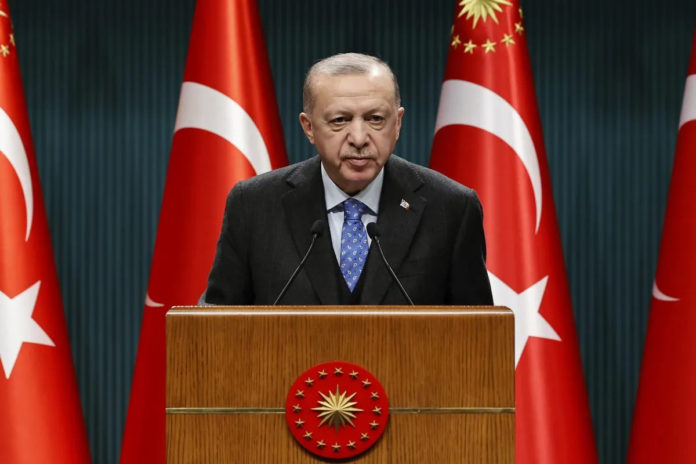Turkey’s coup was foiled and failed with the resolve of its leader Recep Tayyip Erdogan and people. It was a victory of ballot over bullet and commitment of its all political parties including the opposition not to welcome military junta to control the governance. It was die hard support of all the civilian institutions to defend their pitch.
Deity of Democracy became Victorious
It was commitment of all the civil society, educationalists, students and above all common people who did not yield with bullets, tanks, shelling, and use of brutal force by a faction of the Armed Forces of Turkey. The deity of democracy became victorious over the genie of muscular power. Democracy and its trickle down effects in terms of better life, schooling, medical facilities and stability and sustainability were the few decisive factors between darkness and enlightenment. President Recep Tayyip Erdogan emerged as true leader in the time of crises where he led from the front and the rest followed.
Justification of State of Emergency
Although, Turkish President Tayyip Erdogan declared a state of emergency for the next three months in order to complete root-out of conspiracy behind this coup, he promised that it would not affect the daily lives of common people. Erdogan said the state of emergency would allow his government to take swift and effective measures against supporters of the coup and was allowed under the constitution.
He widened a timely crackdown against thousands of members of the security forces, judiciary, civil service and academia after the failed military coup. This has provided a golden chance to minimize elements of radicalization in different segments of Turkish society and administration.
Role of Fethullah Gulen
Erdogan blamed a network of followers of U.S. based cleric, Fethullah Gulen, for the recent attempted coup in which more than 500 people were killed as soldiers commandeered fighter jets, military helicopters and tanks to try to overthrow the government.
Clean-up of Virus
Erdogan, who has led Turkey as prime minister or president since 2003 vowed to clean the “virus” responsible for the plot from all state institutions. The depth and scale of the purges have raised concern among Western allies that Erdogan is trying to suppress all dissent, and that opponents unconnected with the plot will be caught in the net. History of power politics based on conspiracies and plots reveal that halfhearted efforts or any compromised gestures always produced havoc in history and by not taking timely and comprehensive measures now, would resultant in the break of Turkish social fabric in the days to come.
Immediate Repercussions
The failed military coup raised security concerns among all the regional countries and of course NATO where Turkey always plays very important role. Its lira plunged by over 5 percent reflecting investors’ immediate concerns about the situation. It was its all-time low against the US dollar. But the currency has since recovered some of its losses, rising by as much as 2.0 percent against the US dollar within next two days providing yet another example of Turkish markets bouncing back after geopolitical shocks.
Development Oriented Policies
Turkey has a low 32 percent debt-to-GDP ratio and President Erdogan announced an extensive infrastructural investment project would remain on track to provide much needed stimulus. In the first quarter of 2016, the Turkish economy grew by 4.8 percent. Turkey’s Deputy Prime Minister, Mehmet Simsek, renounced all rumors of capital controls, saying “Capital controls are out of the question. Moreover, Turkey’s Central Bank provided unlimited liquidity with Simsek reassuring the markets that Turkey’s “macroeconomic fundamentals remain solid”.
Positive Role of Turkey’s Central Bank
Turkey’s central bank immediately took all precautions to protect financial stability and to calm investors after the failed coup attempt. The central bank said the commission rate of intraday liquidity provided to banks will be zero, and that it will monitor closely market and price moves.
Miracles of Turkish Economic Model
Turkey showed its sustained macro-economic growth in the last one decade under Recep Tayyip Erdogan. It also verified that “Miracles of Turkish Economic Model” is still functional, strong and stable. It is a model that has brought Turkey’s economy to be the 17th largest economy in the world, and has tripled its per-capita income in a decade to US$10,500, three times the Indonesian per-capita income.
Rise to Justice and Development Party (AKP)
Moreover, it is a model that has been supervised and implemented by Tayyip Erdogan, the head of an Islamist party, the Justice and Development Party (AKP), since 2002, when the AKP won a landslide victory in the general election. It completely transformed Turkey into a knowledge based and smarter economy. His business friendly policies trigged its economic growth and outclassed all the regional economies. He gradually introduced economic liberalization, privatization, tax reforms, financial accountability and above all exports oriented model to make Turkey a role model for others to follow.
Integrated but Diversified Macro-Economic Policies of AKP
AKP was formed in 2001 and one year before it became the governing party, Turkey’s economy was in free-fall. The Turkish lira had collapsed, losing 54 percent of its value, and the government’s intention to curb inflation and the lira’s steep fall jacked up interest rates, causing a sharp contraction in the economy.
Justice and Development Party (AKP) Macro-Economic Policy (2002-2016)
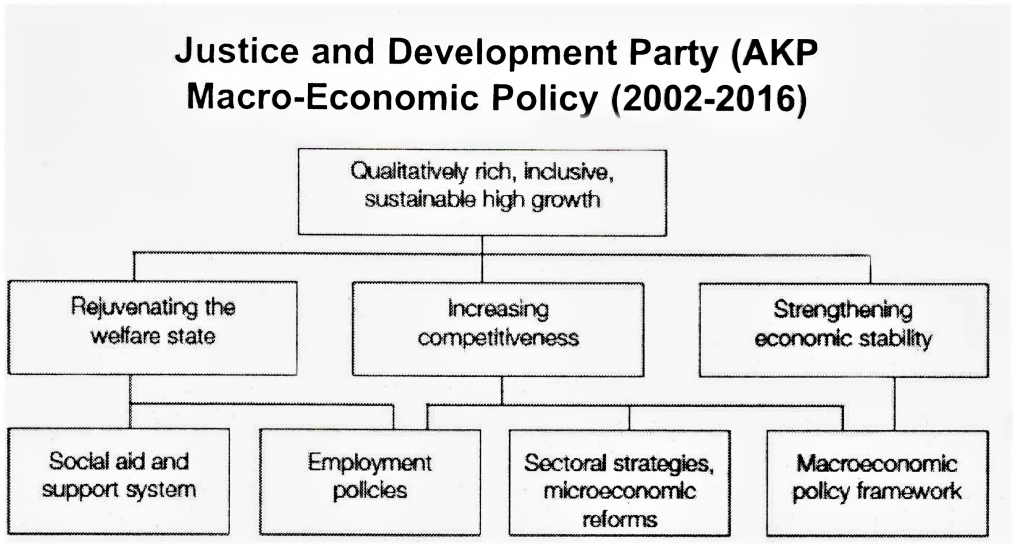
AKP and New Turkey
The AK Party developed a new perspective for the economy, politics and foreign policy collectively referred as the New Turkey. The government emphasized fiscal discipline, structural transformation and privatization. During this period, Turkey rapidly recovered from the negative effects of the 2001 financial crisis and reached a steady growth rate. The country also survived the 2008 global crisis with minimum damage.
The Justice and Development Party (the AK Party) won a landslide victory in the 2002 elections and embarked on a series of reforms in politics, the economy, foreign policy and other key areas that are collectively referred to as the New Turkey. The elections marked the end of a succession of coalition governments that crippled the country for eleven years.
Rigorous Banking & Financial Reforms
The AK Party (2002) further strengthened economic and political stability in the country. The government introduced new regulations for the banking system. It opted for fiscal discipline and privatized state enterprises. It initiated different integrated policies of uninterrupted growth. Meanwhile, the AK Party took measures to strengthen public finance, increase public enterprises’ effectiveness and avoid debt trap. Over the AK Party’s decade-long tenure, three successive governments comprehensively reformed the Turkish economy that currently outperforms a number of crisis-struck Eurozone countries in terms of various macroeconomic indicators.
Economic Bounties of AKP
During the last decade in which the AKP government has been in power, Turkish economy’s average growth rate remained high and stable. During the first three years of the last decade i.e. the 2003-5 period average growth reached 7.7 percent which is a relatively high rate in international terms. The average growth rate decreased to 5.8 percent in 2006-7 and when the crisis hit the world economy to 0.7 percent in 2008 and 4.8 percent in 2009. The growth rate then increased again to 8.9 and 8.5 percent in 2010 and 2011 respectively. It went down to 3.2 percent in the first quarter of 2012.
GDP Growth Rate (%)
The Turkish economy gained resilience against external shocks and recorded one of the most rapid growth periods since 1950 between the years 2002 and 2007, thanks to Recep Tayyip Erdogan.
Initial Economic Challenges and AKP
GDP decreased by 10 percent, and three million Turks became jobless. Initially AKP faced many gigantic economic problems but with determination and vision of Tayyip Erdogan then prime minister of Turkey, economy was successfully sailed through from difficult times. Many expected the party would fail, but they were proved wrong.
Recep Tayyip Erdogan Government’s Commitment to Fiscal Discipline and Consistent Economic Policy
During 2010-2011the Turkish economy recorded an 8.5 percent annual growth to become the world’s second most rapidly growing economy only second to China which grew by 9.2 percent in 2011. The economy continued its growth pattern thanks to the Recep Tayyip Erdogan government’s commitment to fiscal discipline and consistent economic policy at a time when Eurozone countries were severely affected by the global financial crisis.
AKP Economic Liberalization, Privatization and Culture of Globalization
The AKP wisely privatized many industries, promoted globalization and deepened Turkish economic and political ties to Europe. According to Turkish official figures between 2002 and 2007, due to fiscal discipline and prudent macroeconomic management, its GDP nearly tripled from $230 billion to $660 billion, raising the Turkish economy to number seven in the rankings of the European economies and number 16 in the world.
Moreover, over the same period, exports increased from $30 billion to $125 billion, while foreign direct investment (FDIs) fostered at a mind-boggling rate, skyrocketing from just $1 billion to $42 billion.
The country’s strong performance in annual growth between 2002 and 2012 also exerted a positive effect on GDP per capita levels during the same period. In 2012, GDP per capita rose to $10,504 compared to $3,492 in 2002. Meanwhile, Turkey boosted its profile among developing countries with help from its economic growth.
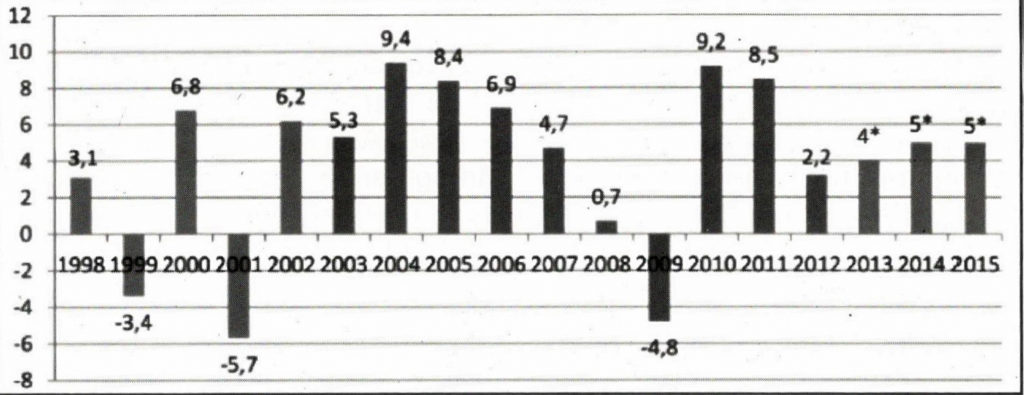
Inflation Rate (%)
The 2001 financial crisis produced dints in Turkey monetary policy and its currency rate management too. It adopted different diversified but integrated policies to curb the rising inflationary ratios and this approach allowed the Turkish economy to record single-digit inflation (9.4 percent) in 2004, following a stunning 54.4 percent in 2001. The economy’s rapid recovery, coupled with political determination, public support and economic stability, motivated the AK Party government’s 2005 decision to drop six zeros from the Turkish Lira.
Institutionalization of Financial Accountability & Discipline
AKP introduced financial accountability and discipline in the country which afterwards, paid dividends. It helped reduce the country’s budget deficit and subsequently improved the public’s fiscal balances. It adopted a 2003 “austerity program” to lower inflation and reduce the budget deficit. Credibility, transparency and predictability represented consistent characteristics of the AK Party government’s annual budgets between 2002 and 2012. The government’s economic policy concentrated on a comprehensive privatization of state owned enterprises and made efforts to reduce public spending during 2004-2007.
Rigorous & Innovative Tax Reforms
The AKP government simplified tax legislations, abolished a tax amnesty from the early 2000s and instead developed a ‘tax peace’ program that increased the number of taxpayers to expand its tax base. Additional tax revenues that these steps generated helped finance the government’s implementation of a new economic program. The Medium-Term Plan also reflected the government’s commitment to fiscal discipline vis-à-vis public finances. The plan estimated a decrease in government spending to GDP ratio of 1.8 percent in 2015.
AKP Social Developments and Nets
AKP developed a comprehensive network of social welfare programs and mandated a number of institutions and agencies for their implementation in throughout the country. During 2002-2007 the government provided additional funding for social aid programs in order to render low-income households less vulnerable to existing and future risks associated with economic crises.
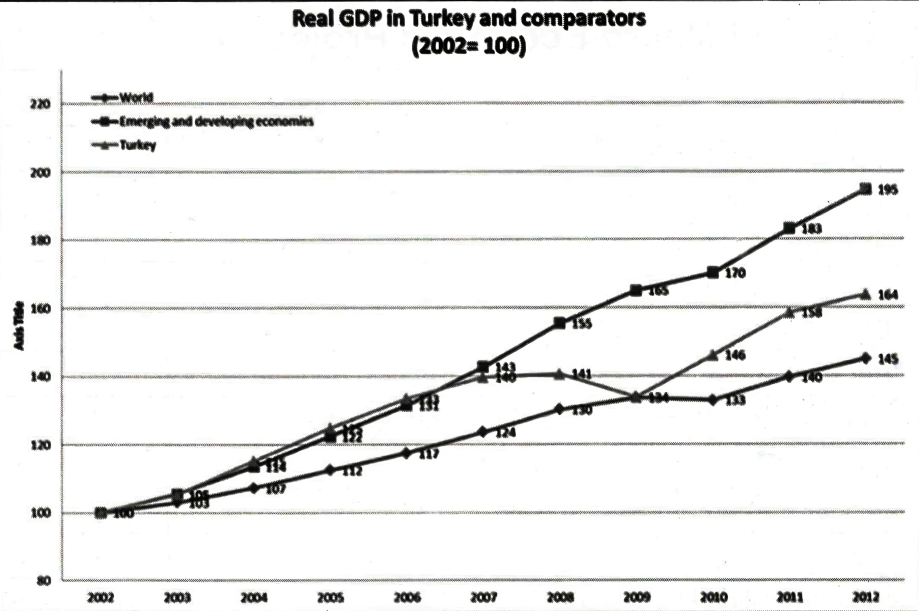
Utility of Social Risk Mitigation Project (SRMP)
The Social Risk Mitigation Project (SRMP) spent a total of $500 million between 2001 and 2006 to monitor and reduce poverty as well as to strengthen relevant institutions. Furthermore, the social aid regime of to Recep Tayyip Erdogan covered medical costs of low-income citizens and offered in kind and cash assistance through programs for children, students, the elderly and people with disabilities. Meanwhile, the government made additional funds available to government agencies that provide basic social services to low-income families.
Inflation Rate (%)
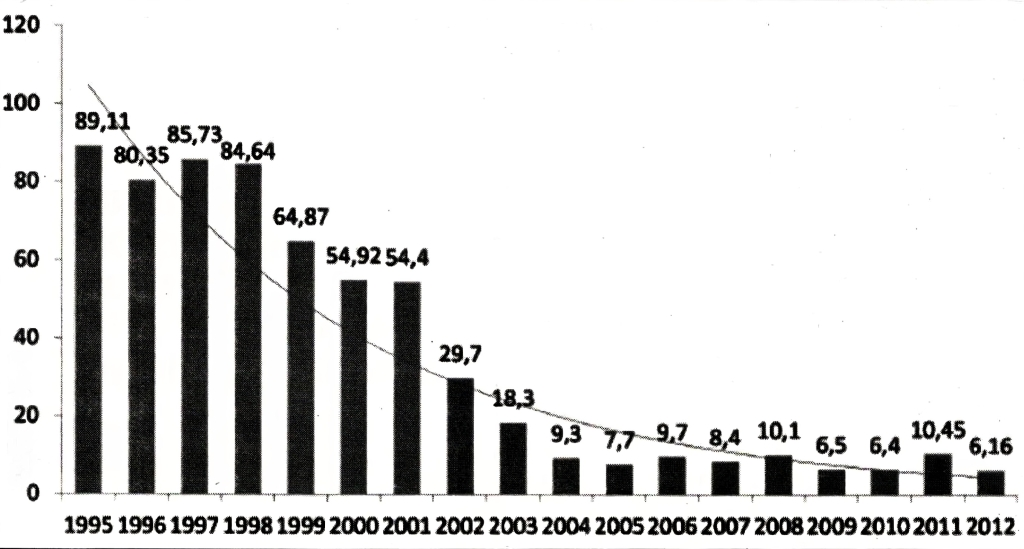
Catering to lowest income groups through “Conditional Cash Transfer Program”
The AKP government introduced the “Conditional Cash Transfer Program”, a social support system for the lowest income groups aiming to increase the efficiency of basic health and education services. Furthermore, government agencies took additional steps to allow low-income individuals greater access to social services for income generation and job creation.
Selected Macro-Economic Projections
| Indicators | 2012- 15 | 2016-19 | 2020-23 |
| GDP growth % | 6.1 | 7.2 | 7.5 |
| Investments/GDP | 23.1 | 24.8 | 25.0 |
| Savings/GDP | 23.1 | 24.8 | 25.0 |
| Domestic Savings/GDP | 18.8 | 21.2 | 22.0 |
| GDP (Billion current US Dollar) | 1127 | 1700 | 2600 |
| Per Capita | 14700 | 23500 | 31500 |
| Job Creation (Yearly average of period, thousands) | 620 | 795 | 970 |
| Employment Rate (%) | 44.9 | 48.0 | 52.0 |
| Labour Force Participation Rate | 49.1 | 51.7 | 55.2 |
| Women | 32.8 | 36.4 | 40.0 |
| Exports (billion US Dollars) | 245 | 396 | 650 |
Dividends of High Social Development
Social Policies in 2011 attested to the AK Party government’s commitment to enhancing the quality of social services. The government allotted a greater share of the 2013 annual budget to the Ministry of Family and Social Policies than other ministries: The Ministry’s annual budget increased to TL 14.7 billion in 2013 compared to TL 8.8 billion the previous year.
The Turkish economy’s strong performance also made additional funds available for social policies. While expenditures related to social aid and services amounted to 0.5 percent of Turkey’s annual GDP in 2002, total social spending including Social Security Agency’s various payments rose to 1.42 percent of GDP in 2011.13. In absolute terms, social spending increased from TL 1.376 million in 2002 to TL 18.216 million in 2011.
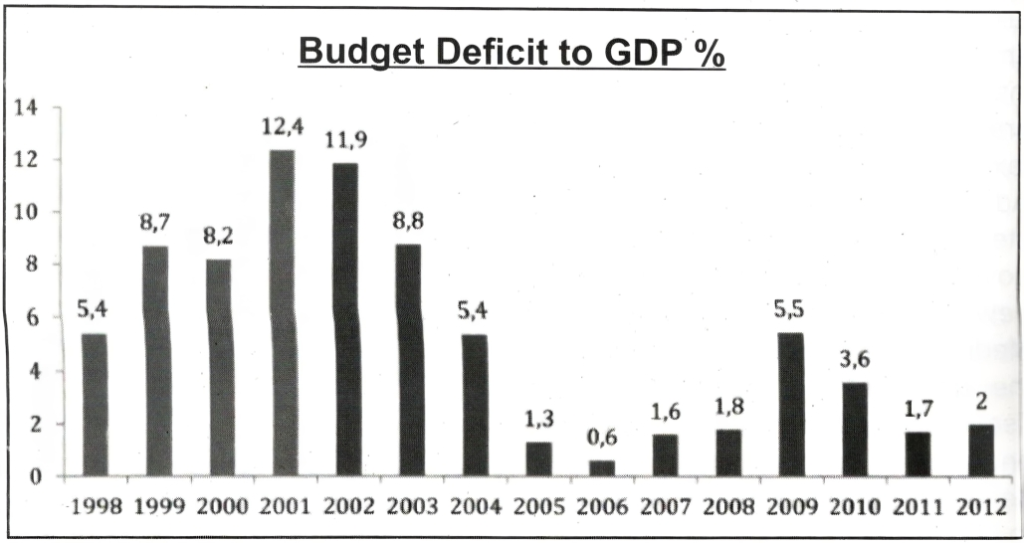
AKP Future Economic Predications
The AK Party government in near past announced that it aimed to increase the country’s GDP to $2 trillion and GDP per capita to $25,000 by 2023. Moreover, the government expects the annual export volume to reach $500 billion by 2023 and to double the total number of exporters to 100,000 companies.
The turnaround of the macro-economy made the AKP and its leaders hugely popular in Turkey, and the party won victories in the subsequent elections despite fierce opposition from the powerful military, which is staunchly nationalist and secular. But AKP did hide its identity i.e. Islam. Now it is not a Calvinist Burghers of northern Europe in the 16th century or “Islamic Calvinism” it is just Islamic junctions. An ethic of hard work and thrift committed to investment and economic growth, combined with strict piety and entrepreneurship are the few qualities of AKP which is still functional.
AKP and Transformation of Turkey
The AKP and its followers assert that they have abandoned the idea of transforming Turkey into a fundamentalist state. They are in favor of building a more open society, based on liberal democracy and economic development based on entrepreneurial capitalism and globalization.
Concluding Remarks
Recep Tayyip Erdogan successfully managed the failed military coup and neutralized its spillover affects to different sectors and segments of Turkey by taking all possible economic, political and the last but not the administrative measures. The failed coup was defeated with the strong will of people, who laid down their lives for democracy, protection of human rights, development and freedom of expression.
The military coup was defeated through the magic of continued socio-economic prosperity since 2002 under the regime of the Justice and Development Party (AKP) which enforced the common people to stand against military tanks to safe-guard their present and future endeavors. It was economic growth of more than last 14 years in Turkey which prompted its common people to fight against all odds to restore democracy and its true spirits in the country. It was constantly, rising per capita income of the people of Turkey which spirited them to stop any military intervention in the country. Last but not the least, it was marvelous social development over the last 5110 days which prepared its people to say no to any military misadventure.
Recep Tayyip Erdogan once again sailed Turkey from the shores of political uncertainties to the banks of greater socio-economic-politico stability and sustainability. Fethullah Gulen although a businessmen-cum religious scholar, he should not play with the sentiments of common people through his clergy. Islam is the religion of peace and submission which must not the used for any kind of chaos, division and conspiracy.
The failed coup also unearthed some bitter facts about today Turkey. Turkey’s deviant stances on foreign policy (Syria, Russia, Iraq), power struggle with Kurds, fight against ISIS and the dreaming of EU’s membership must be reevaluated. Civil-Military balance has been swinging in favor of AKP and its successive government which needs to be rationalized through general amnesty. Political frustration among the political parties must be diminished through greater political dialogue, accommodation and mainstream spirits.
Dysfunctionality in the judiciary needs a comprehensive framework because justice delayed is justice denied. Rule of law and restoration of social justice is the need of the hour in Turkey. Reformation of Turkish national narratives towards Kurds and fight against terrorism and specifically ISIS ought to be reframed. Societal division in two distinctive poles “Islamists” and “moderates, secular and liberal” should be urgently abridged.


